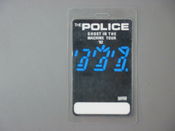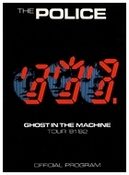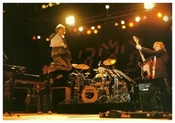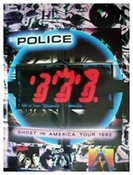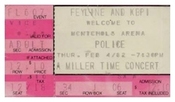
Ghost In The Machine
Feb
4
1982
Denver, CO, US
McNichols Arenawith The Go-Go's
Denver fans warm up to Police and Go-Go's...
Denver - Brrrrrr. When the races had to be cancelled at the Interstate Kennel Club here late last week because of the bitter cold, everybody got a kick out of saying it wasn't even fit outside for a dog. But the Denver rock audience is a hardy bunch that isn't about to be intimidated by anything as simple as the weather.
I discovered that last summer when 5,000 fans sat without flinching through a downpour so severe at an outdoor Bruce Springsteen concert here that Springsteen ended up heading for cover before they did.
In that same spirit, fans simply dug out their heavy clothes and trekked through the snow and a wind chill factor of minus 15 degrees last Thursday to see the Police and the Go-Go's at the 17,000 seat McNichols Arena.
However frigid the weather, these are two hot bands. The Police's new 'Ghost In The Machine' album is nearing the 1.5 million sales mark, and the Go-Go's debut LP is closing in on 1 million.
In fact, the L.A. based Go-Go's are doing so well these days that the female band was scheduled to drop off the tour after a weekend show in Phoenix, leaving Oingo Boingo to open for the Police during the band's three-day Inglewood Forum engagement, which begin tonight.
Though the Go-Go's, who'll be strictly headliners from now on, have had only one Top 20 single so far, the group's highly accessible, teen-bounce music is so exquisitely designed that the group's hour longlong set Thursday seemed like a greatest-hits collection. Much of the audience was on its feet the entire time, cheering the band.
Even so, the Police was in no danger of being upstaged. The trio, whose reggae-tinged brand of rock combines an unusually high degree of intelligence and sensuousness, has resolved some of the danger signs of its last tour and reasserted itself as one of the premier attractions in rock.
That's good news. In a time when few bands admired by critics and adventurous rock fans attract enough of a mainstream following to justify a multinight arena stand, the Police is a band we can all support.
Though the jump in three years from clubs like the Whisky to three nights at the Forum isn't unprecedented, the Police is the first of the England-based new=wave groups to achieve it. And the band's life style on the road now - limos, private jets and hotel suites - is a long way from the deliberate no-frills machinery of their first station-wagon tour of the United States.
The three members of the Police - lead singer and bassist Sting, drummer Stewart Copeland and guitarist Andy Summers - always seemed more practical than many rockers. But the sudden fame common in rock can often distort the most firmly rooted attitudes.
About the Police's climb, Summers said during a sound check here, ''Things did get a little distorted. It's hard to keep your perspective sometimes because you're dealing with your personal life and your life with the band. There are a lot of balls to keep juggling in the air. There's always the danger of getting carried away with yourself and falling for the myths about being a rock star. I'm too interested in carrying on as an artist to want to get myself screwed up. We all have that attitude and we keep an eye on each other.''
Because he is the group's singer, main writer and reigning sex symbol, Sting is open to the most pressure. To compound matters, he's trying to balance a career as an actor (an impressive debut in the film 'Quadrophenia') and musician.
But Sting, an unusually unaffected member of the rock-star fraternity, seems equally determined to avoid the superstar syndrome. ''I'm not fundamentally any different than I was five or six years ago. One thing that helps is that the blueprint for disaster in rock is so well documented. You just avoid the pitfalls, which are drugs and a life style I don't have much interest in anyway. I don't hang around rock stars. All that stuff bores me. That's one reason I'm interested in acting. I have a very low tolerance of boredom. I love music very deeply, but it's not everything.''
One of Sting's strengths as a writer is that he can weave involving themes, from the social commentary of 'Invisible Sun' to the shy romanticism of 'Every Little Thing She Does Is Magic', into extremely inviting pop exercises.
''My songs are really a signature, a statement about me,'' he said. ''A lot of writers tend to reinforce a single image, but I'm trying to create a whole person. I'm interested in some social matters, but no one is totally political. Look at 'Demolition Man'. It's totally about a destructive element in me. I'm very, very destructive in some ways.''
There were some disturbing signs in the Police's Los Angeles Sports Arena appearance last year, including a distracting overemphasis on the kimono-clad Sting's sexy image, and a tendency to sacrifice some of the nuances that give the group's music such character to a sheer, ''wow-em'' energy.
At McNichols Arena, however, there wasn't a hint of either problem. Sting is a handsome devil who remains highly charismatic, but he has done away with the kimono and some of the early pin-up aura. The band, augmented by three horn players this trip, also played with a frequently dazzling precision and power that enabled them to combine the energy and the nuance.
But the best thing about the new tour is the group's reliance on material from the new album. After the great promise of its first LP, the level of the Police's songs wavered noticeably in its second and third collections. An occasional gem like the lonely outcry of 'Message in a Bottle' and the ''Lolita''-themed 'Don't Stand So Close To Me' was easily lost amid moody, undistinguished fare.
The new 'Ghost' album is still inconsistent, but the best tunes, from the sing-along commentary of 'One World (Not Three)' and 'Spirits in the Material World' to the playfulness of 'Demolition Man', provided strong opening and closing moments for the band's enthusiastically received Denver concert.
Despite the warmth of the crowd, however, the band, whose recent concerts had been in foul-weather cities was eager to move on to Phoenix and Los Angeles.
(c) The Los Angeles Times by Robert Hilburn
Denver - Brrrrrr. When the races had to be cancelled at the Interstate Kennel Club here late last week because of the bitter cold, everybody got a kick out of saying it wasn't even fit outside for a dog. But the Denver rock audience is a hardy bunch that isn't about to be intimidated by anything as simple as the weather.
I discovered that last summer when 5,000 fans sat without flinching through a downpour so severe at an outdoor Bruce Springsteen concert here that Springsteen ended up heading for cover before they did.
In that same spirit, fans simply dug out their heavy clothes and trekked through the snow and a wind chill factor of minus 15 degrees last Thursday to see the Police and the Go-Go's at the 17,000 seat McNichols Arena.
However frigid the weather, these are two hot bands. The Police's new 'Ghost In The Machine' album is nearing the 1.5 million sales mark, and the Go-Go's debut LP is closing in on 1 million.
In fact, the L.A. based Go-Go's are doing so well these days that the female band was scheduled to drop off the tour after a weekend show in Phoenix, leaving Oingo Boingo to open for the Police during the band's three-day Inglewood Forum engagement, which begin tonight.
Though the Go-Go's, who'll be strictly headliners from now on, have had only one Top 20 single so far, the group's highly accessible, teen-bounce music is so exquisitely designed that the group's hour longlong set Thursday seemed like a greatest-hits collection. Much of the audience was on its feet the entire time, cheering the band.
Even so, the Police was in no danger of being upstaged. The trio, whose reggae-tinged brand of rock combines an unusually high degree of intelligence and sensuousness, has resolved some of the danger signs of its last tour and reasserted itself as one of the premier attractions in rock.
That's good news. In a time when few bands admired by critics and adventurous rock fans attract enough of a mainstream following to justify a multinight arena stand, the Police is a band we can all support.
Though the jump in three years from clubs like the Whisky to three nights at the Forum isn't unprecedented, the Police is the first of the England-based new=wave groups to achieve it. And the band's life style on the road now - limos, private jets and hotel suites - is a long way from the deliberate no-frills machinery of their first station-wagon tour of the United States.
The three members of the Police - lead singer and bassist Sting, drummer Stewart Copeland and guitarist Andy Summers - always seemed more practical than many rockers. But the sudden fame common in rock can often distort the most firmly rooted attitudes.
About the Police's climb, Summers said during a sound check here, ''Things did get a little distorted. It's hard to keep your perspective sometimes because you're dealing with your personal life and your life with the band. There are a lot of balls to keep juggling in the air. There's always the danger of getting carried away with yourself and falling for the myths about being a rock star. I'm too interested in carrying on as an artist to want to get myself screwed up. We all have that attitude and we keep an eye on each other.''
Because he is the group's singer, main writer and reigning sex symbol, Sting is open to the most pressure. To compound matters, he's trying to balance a career as an actor (an impressive debut in the film 'Quadrophenia') and musician.
But Sting, an unusually unaffected member of the rock-star fraternity, seems equally determined to avoid the superstar syndrome. ''I'm not fundamentally any different than I was five or six years ago. One thing that helps is that the blueprint for disaster in rock is so well documented. You just avoid the pitfalls, which are drugs and a life style I don't have much interest in anyway. I don't hang around rock stars. All that stuff bores me. That's one reason I'm interested in acting. I have a very low tolerance of boredom. I love music very deeply, but it's not everything.''
One of Sting's strengths as a writer is that he can weave involving themes, from the social commentary of 'Invisible Sun' to the shy romanticism of 'Every Little Thing She Does Is Magic', into extremely inviting pop exercises.
''My songs are really a signature, a statement about me,'' he said. ''A lot of writers tend to reinforce a single image, but I'm trying to create a whole person. I'm interested in some social matters, but no one is totally political. Look at 'Demolition Man'. It's totally about a destructive element in me. I'm very, very destructive in some ways.''
There were some disturbing signs in the Police's Los Angeles Sports Arena appearance last year, including a distracting overemphasis on the kimono-clad Sting's sexy image, and a tendency to sacrifice some of the nuances that give the group's music such character to a sheer, ''wow-em'' energy.
At McNichols Arena, however, there wasn't a hint of either problem. Sting is a handsome devil who remains highly charismatic, but he has done away with the kimono and some of the early pin-up aura. The band, augmented by three horn players this trip, also played with a frequently dazzling precision and power that enabled them to combine the energy and the nuance.
But the best thing about the new tour is the group's reliance on material from the new album. After the great promise of its first LP, the level of the Police's songs wavered noticeably in its second and third collections. An occasional gem like the lonely outcry of 'Message in a Bottle' and the ''Lolita''-themed 'Don't Stand So Close To Me' was easily lost amid moody, undistinguished fare.
The new 'Ghost' album is still inconsistent, but the best tunes, from the sing-along commentary of 'One World (Not Three)' and 'Spirits in the Material World' to the playfulness of 'Demolition Man', provided strong opening and closing moments for the band's enthusiastically received Denver concert.
Despite the warmth of the crowd, however, the band, whose recent concerts had been in foul-weather cities was eager to move on to Phoenix and Los Angeles.
(c) The Los Angeles Times by Robert Hilburn

